
2024 was a year filled with many exciting experiences and moments for Portland Japanese Garden. In its 61st year, the Garden reaffirmed its place as a tranquil urban oasis and home for cultural understanding. Let’s take a look back at all that happened in 2024 at Portland Japanese Garden. We also have two more end-of-year reviews: a look back at notable press coverage and a collection of original writing.
January
O-Shogatsu, Japanese New Year
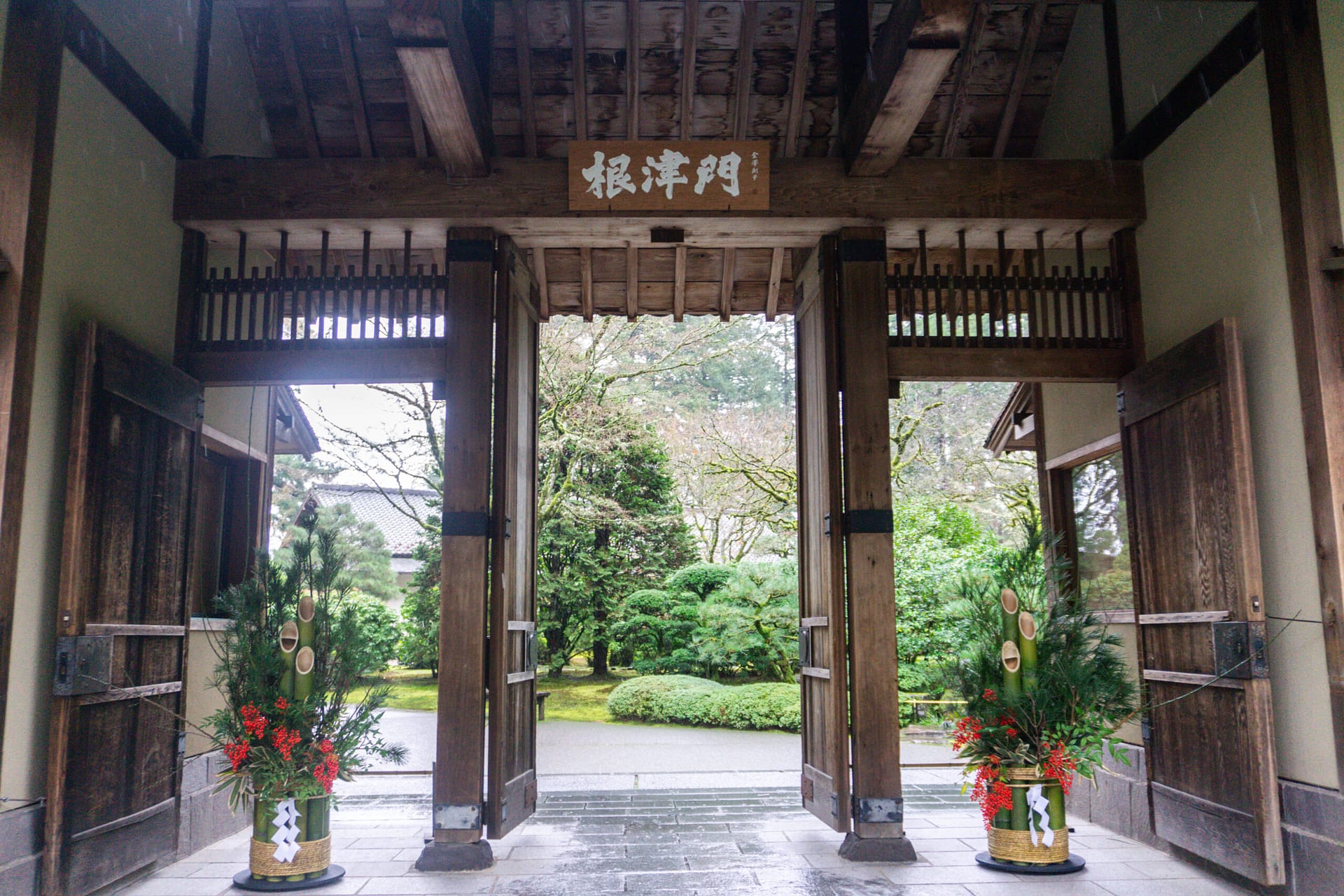
Portland Japanese Garden celebrates the new year two times and that was once again the case in 2024. On January 1, the Garden was open exclusively to members and then on January 7, it hosted a festival celebration for all. On this chilly but cheerful day, guests had the chance to participate in sumi-e, Japanese brush painting, learn how to make traditional arrangements of pine, bamboo, and plum branches (kadomatsu), and enjoy performances by Oregon Koto-Kai.
Textile Workshop Teaches Japanese Stitching and Mending Techniques
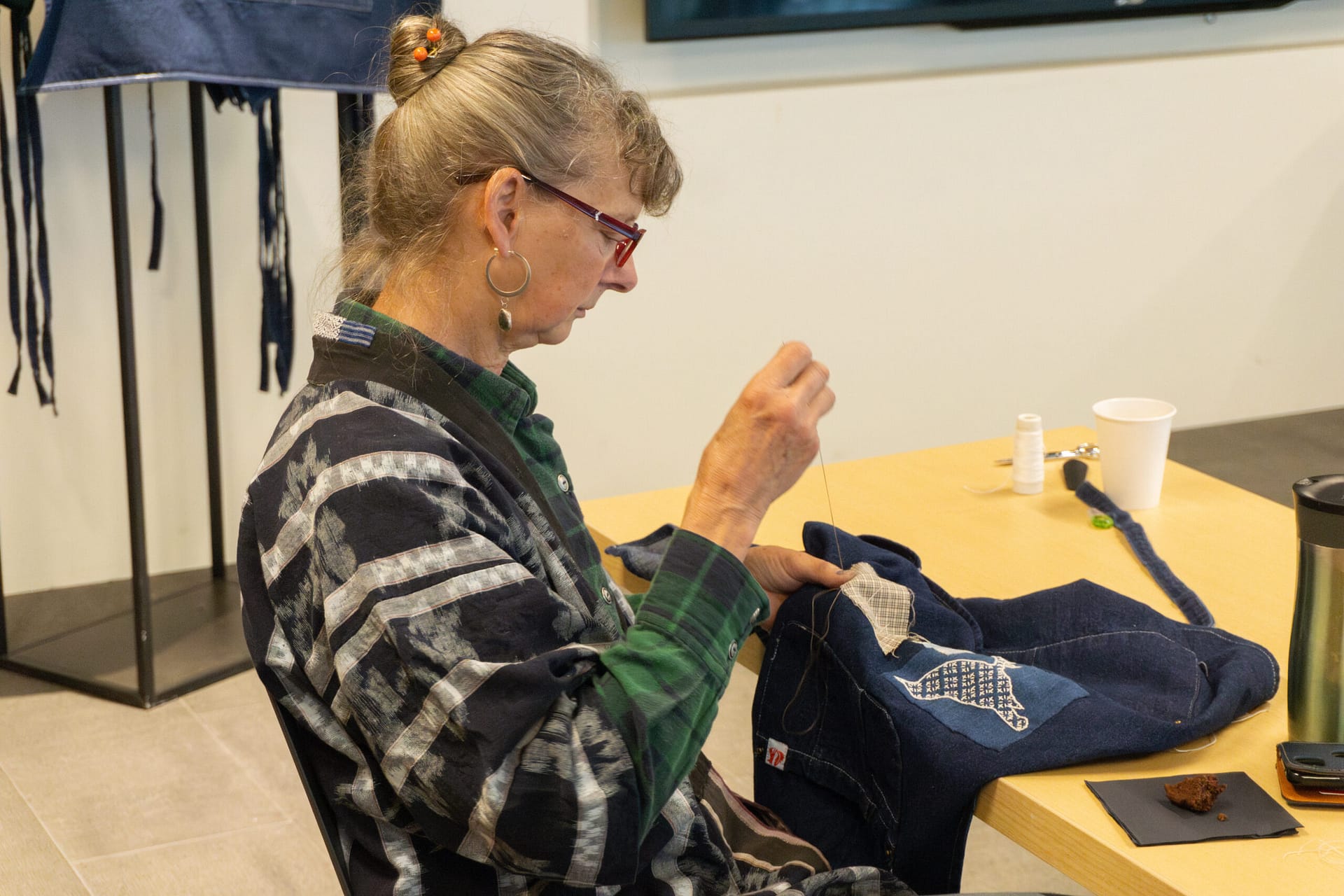
The Garden once again partnered with textile artisan Judliee Fitzhugh to offer a series of four textile workshops beginning in January and running through February. The learners became acquainted with chikuchiku, a loose and playful form of stitching named for the sound of a needle going through fabric, sashiko, a form of mending known for its striking traditional indigo-and-white color scheme and complex decorative patterns, and the process of making happi, loose-fitting casual cotton jackets often worn at festivals.
The Garden Appoints Lisa Christy as Executive Director

At the beginning of the year, the organization saw the appointment of Lisa Christy as Executive Director of the organization. Christy has been with the Garden since 2014 and, for the past five years, served as Chief External Affairs Officer. Christy, a volunteer member of Japan-America Society of Oregon’s Board of Directors, was initially hired by Portland Japanese Garden as Director of Marketing and Communications in 2014 after having spent nearly a decade guiding award-winning campaigns for the premiere advertising agency, Wieden + Kennedy. In 2018, Christy ascended to the role of Chief External Affairs Officer and took on oversight of its membership, marketing, communications, fundraising, and community relations efforts. She has helped drive record-setting admission for the Garden year over year – even in 2016 when the organization had to close as it embarked on an historic expansion of its grounds from 5.5 acres to 12. Christy also helped lead fundraising and communication efforts that gave the organization stability as it navigated the COVID-19 pandemic. Upon Bloom’s retirement, she took on oversight of the Garden as it undergoes its search for a CEO.
The Garden Weathers a Fierce Winter Storm

In January, the Portland metro area got waylaid by a ferocious winter storm. A weather event so destructive that it resulted in Oregon Governor Tina Kotek declaring a state of emergency, the region saw homes and vehicles destroyed by falling trees, city streets and sidewalks caked in thick ice, widespread power outages, injuries, and death. Fortunate to have escaped irreversible damage, Portland Japanese Garden was still nonetheless among the many local organizations and attractions that were impacted.
February
Winter Ikebana Workshop Teaches Methods from Ohara School

Headed by Carolyn Alter, a longtime Garden cultural partner and Head Teacher of the Ohara School of Ikebana’s Oregon Chapter, students learned more about the art of ikebana, which translates to “living flowers” or “giving life to flowers,” and is unique from other approaches to flower arrangements. Alter instructed participants in beginner Hana Isho (flower design) in the Ohara School method and based on the curriculum set forth by the Ohara School of Ikebana, an institution known for moribana, which breaks with more traditional and formal vertical styles, creating new horizontal “landscape” arrangements, with flowers “heaped” (moru) in lower plate-like containers.
“Living Traditions” Presents First In-Person Installment at Iconic Offices of Wieden+Kennedy

Japan Institute of Portland Japanese Garden for the first ever in-person installment of Living Traditions, a series of conversations and talks that explore some of the most iconic facets of Japanese culture, at the iconic Portland advertising agency, Wieden+Kennedy. “A Conversation on Art, Architecture, and Landscape” explored the future of urban environments and the evolving roles of creative institutions to inspire civic discourse. The afternoon included remarks from Yuko Hasegawa, Japan’s foremost contemporary art curator, and a panel discussion featuring luminary speakers including architect Shohei Shigematsu (Director of OMA NYC) and landscape architect Dorothée Imbert (Director of the Knowlton School of Architecture, The Ohio State University). Professor Ken Tadashi Oshima (Professor of architecture, University of Washington, Seattle) will moderated this invigorating dialogue that was supported by the Government of Japan and presented in partnership with Japan Society (NY).
Mindfulness Tours Return
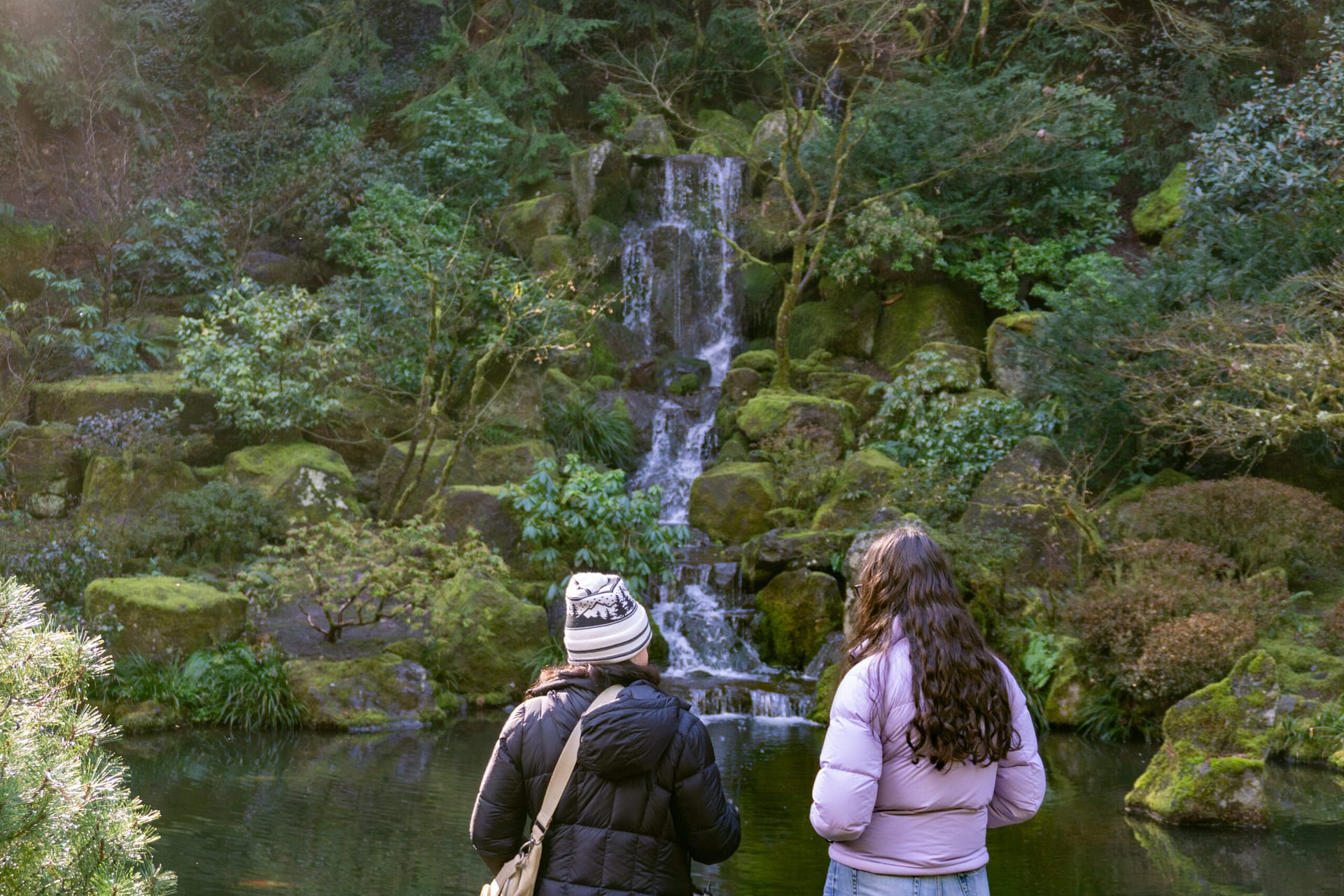
In 2024, the Garden saw the return of its highly popular Mindfulness Tours, an intimate gathering that focuses not on meditation, but instead on learning to bring mindful awareness to oneself, and the world around us, through intentional observation and connections. Experienced guides provided a foundation for the art of contemplative exploration throughout various Garden spaces, and gently guided awareness away from the busyness of everyday life, back toward the connection to nature and experience of peace.
Strolling Pond Garden Undergoes Rehabilitation

In February, guests to Portland Japanese Garden may have noticed that rehabilitation in the Strolling Pond Garden was underway to help maintain a part of the landscape that has been a site of calmness and serenity for more than 60 years. The upper pond, itself the northernmost part of the Strolling Pond Garden and site of many recognizable features including the Peace Lantern and bronze cranes donated from the Bank of Tokyo, had been experiencing some leakage.
March
Hina Matsuri, Doll’s Day

Hina Matsuri, also called Doll’s Day or Girl’s Day, is celebrated each year in Japan in March to celebrate the happiness, growth, and good health of girls. In Japan, families with daughters mark the festival by displaying intricately crafted hina dolls dressed in ornate costumes several days before the festival.Visitors to the Garden’s Hina Matsuri celebration were able to view and take photos with a traditional display of hinadolls in the Cathy Rudd Cultural Corner, participate in family-friendly ikebana classes, and enjoy music and dance performances from Takohachi.
Vision of Place Celebrates Portland’s Relationship with Sapporo and Hokkaido

Celebrating 65 years of the Portland and Sapporo Sister City relationship, the art exhibition Vision of Place welcomed the work of a local Portland photographer and Hokkaido-based photographers to showcase the beauty of Japan’s northernmost prefecture, Hokkaido. The North Finder, a Hokkaido-based group of photographers, presented work that captured the diversity of natural environments, distinctive seasons, and notable sites of Portland’s sister city. Also featured were photographs from Sandra Chandler, a passionate photographer who has been a longtime supporter of Portland Japanese Garden and serves as its Foundation Board Chairperson. Chandler showcased the essence of the serene winter landscape of Hokkaido, Japan’s northernmost island.
April
Portland Japanese Garden’s Curators Welcome Guests for Tea and Conversation

At this event, exclusive to those in the Golden Crane Recognition Society, guests enjoyed cups of warm tea and conversation with two of the Garden’s cultural experts: Aki Nakanishi, Arlene Schnitzer Curator of Culture, Art, and Education, and Hugo Torii, Garden Curator. They discussed their worldview on gardens and art as well as the influence their native home of Japan has on their work today.
Bonsai Society of Portland Returns to Exhibit at the Garden after Six Years

Portland Japanese Garden was pleased to welcome back the Bonsai Society of Portland (BSOP) for a bonsai exhibition. BSOP, the largest bonsai club in the United States, last exhibited at the garden in 2018. This exhibition includde dozens of bonsai from their members’ private collections, including several world-class examples of this ancient Japanese art form. Guests saw coniferous, deciduous, fruiting, and flowering species, ranging in size from three-foot-tall specimens to tiny shohin trees small enough to hold in the palm of a hand. This weekend in April also featured demonstrations by BSOP President Andrew Robson and a book signing by Michael Hagedorn, bonsai consultant for Portland Japanese Garden.
The Garden Partners with Portland State University’s Center for Japanese Studies For Evening of Sake and Food

Kanpai Japan is a month-long introduction and celebration of Japanese food and drink culture organized by the Center for Japanese Studies at Portland State University in collaboration with partner organizations across the city. The kick-off event at the Garden featured Japanese delicacies and beverages that showcased the area’s vibrant Japanese food culture. Bamboo Sushi, Joto Sake, Kuze Fuku & Sons, SakéOne, and Zupan’s Markets offered food and drinks as part of this exciting culinary experience.
May
Garden Hosts Asian American Native Hawai’ian Pacific Islander Roundtable Discussion

In celebration of Asian American, Native Hawai’ian, and Pacific Islander (AANHPI) Heritage Month, Portland Japanese Garden hosted a gathering of Asian and AANHPI leaders in the cultural institution, nonprofit, and public service sectors at the end of May. The roundtable discussion was centered around the theme, “How can we create a stronger AANHPI community in Portland?”
Portland Japanese Garden Joins Governor Tina Kotek and AANHPI Community at Oregon Rises Above Hate Event

In May, Portland Japanese Garden once again proudly joined in Oregon Rises Above Hate’s (ORAH’s) annual event that kicks off AANHPI Heritage Month for our community. ORAH is a local organization that amplifies AANHPI voices while also connecting this community with each other. This year, a free and day-long celebration was held at Lan Su Chinese Garden and also saw participation from our friends at other cultural institutions including the Japanese American Museum of Oregon, Portland Chinatown Museum, and the Oregon Jewish Museum and Center for Holocaust Education. One of the many highlights of the day was a visit from Oregon Governor Tina Kotek. Aside from visiting the Garden’s table at Lan Su, the Governor signed a proclamation commemorating May as AANHPI Heritage Month. “This month, and every month, Oregon celebrates Asian Americans, Native Hawai’ians, and Pacific Islanders for their central role in our society and we honor the vibrant cultural tapestry and collective history they bring to our state,” the proclamation read in part.
Kodomo no Hi, Children’s Day

Kodomo no Hi, also called Children’s Day, is commemorated each year in Japan in May to celebrate the growth and good fortune of children. Portland Japanese Garden’s celebration of the festival in 2024 featured a range of family-friendly activities including taiko performances by enTaiko, opportunities to learn origami from expert Yuki Martin, and displays of koinobori, or cloth carp streamers. Guests also got to enjoy a new bright and joyful map created by local Portland artist Mike Bennett and learn more about koi from experts Linda Montgomery and Danielle Cheney.
Annual Membership Meeting

The Annual Membership Meeting was a memorable one in which CEO Steve Bloom, who was hired to the role in 2005, announced his plans to retire. It also featured a special presentation by guest speaker, Ann Burroughs. Burroughs is the President and CEO of the Japanese American National Museum and is an internationally recognized leader in the field of human rights and social justice. The event also commemorated the election of Paul Schommer as the new President of the Board of Trustees and honored Dr. Calvin Tanabe as Trustee Emeritus in recognition of his outstanding generosity and leadership during his tenure on the Board.
CEO Steve Bloom Announces His Retirement
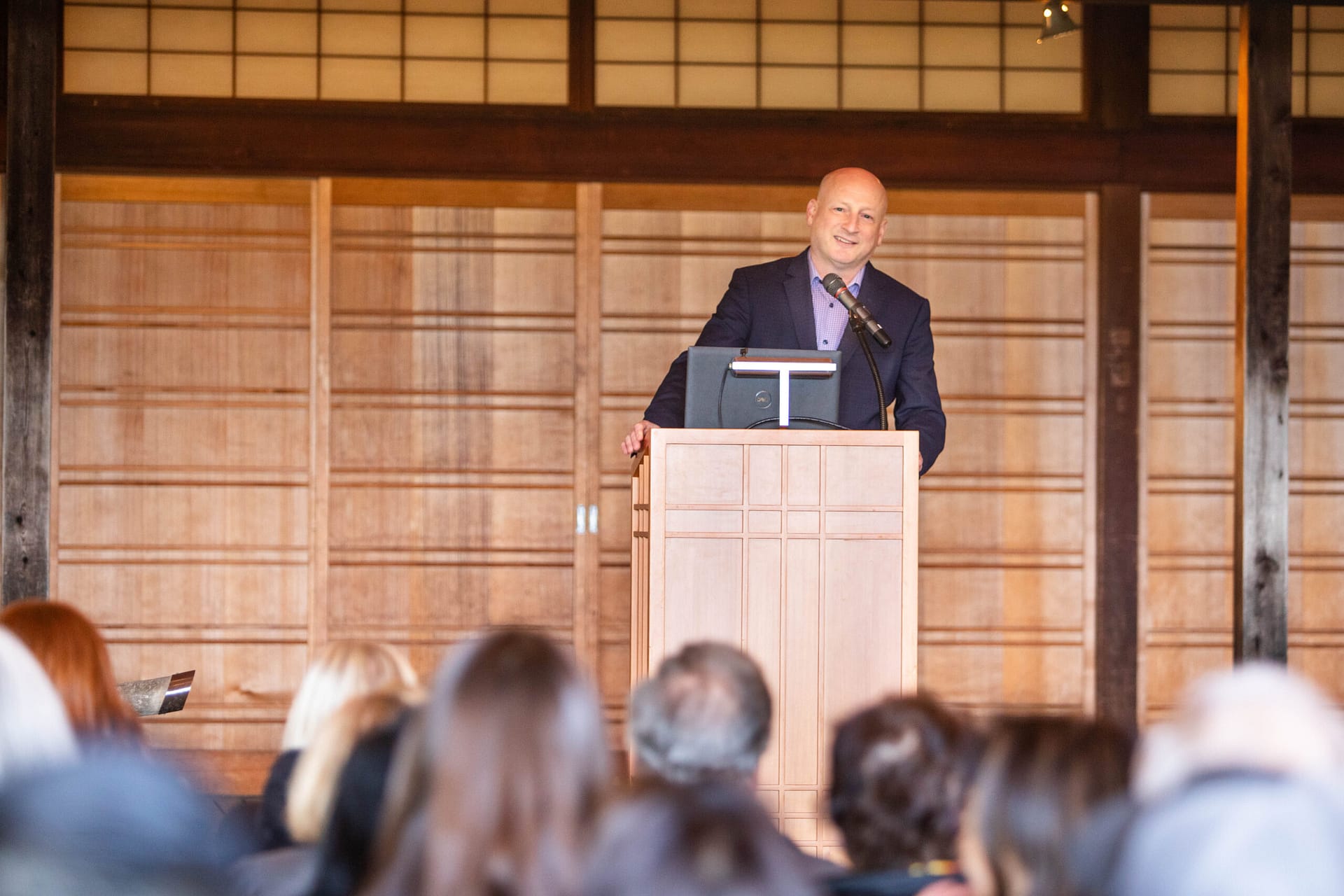
In a letter to the community of Portland Japanese Garden, CEO Steve Bloom (2005-24) announced his plans to retire. “After 33 years of public service, during which time I was fortunate to see Portland Japanese Garden blossom into a world class cultural organization, the time has come for me to pursue and accomplish some of my other dreams and life aspirations,” Bloom wrote.
The Garden Gets Featured on Google Arts & Culture

Portland Japanese Garden was selected as one of 16 partners to celebrate its home city’s thriving cultural scene through the Google Arts & Culture platform. The Garden is proud to be a part of this prestigious project and part of the Google world as it reinforces how we are an indelible thread in our city’s fabric–its history, its culture, and its appeal. Click here to visit Portland Japanese Garden’s page on Google Arts & Culture.
New Hinoki Hedges Replace Hemlock in the Tea Garden

In March, the Garden Department of Portland Japanese Garden and its leader, Garden Curator Hugo Torii, engaged in a project to improve the Tea Garden. Its outer periphery of hemlock hedges had been facing continual decline. After the hemlock was removed and the drainage improved, the space was filled with nearly 20 new hinoki, a cypress native to Japan that has been known to have been a part of Japanese garden design since the nation’s Heian period (794-1185).
Japan Institute Co-Presents Symposium at University of Tokyo with International Horticultural Expo 2027

In May, Japan Institute and Portland Japanese Garden collaborated with the International Horticultural Expo 2027, also known as “GREEN x EXPO 2027,” to present a symposium at the acclaimed University of Tokyo in Japan. Titled “Why Japanese Gardens Now?” the event convened some of the nation’s preeminent thought leaders in the fields of gardening, architecture, landscape architecture, and academia to discuss the global appreciation of Japanese gardens. They examined the evolving cultural significance of these vital natural spaces, their ability to foster community, and what the future holds in store for them.
June
The Garden Opens its New Membership Center

Portland Japanese Garden was excited to welcome members to the new Membership Center! Located in the heart of the Garden and adjacent to the wisteria arbor, this became an opportunity to get to know our members better and create opportunities for in-person connections. Members are invited to come in, ask questions, learn about their benefits, renew memberships, and even buy gift memberships for the loved ones in their life. Additionally, visitors are able to turn their paid admission tickets into memberships here.
Portland Japanese Garden Joins Other Great Global Gardens for Simultaneously Held Yoko Ono Art Installation

Japan Institute and Portland Japanese Garden partnered with the Nobel Peace Center, Yoko Ono’s studio and public gardens around the world to feature a global Wish Tree installation. The Wish Tree is an interactive artwork created by acclaimed artist and global peace advocate Yoko Ono. The trees were installed in the Atsuhiko and Ina Goodwin Tateuchi Foundation Courtyard, where visitors were invited to reflect and write their wishes for peace that were then tied to the Wish Tree’s branches. The wishes were then preserved in the IMAGINE PEACE TOWER in Reykjavík, Iceland.
Portland Japanese Garden and Japan Institute Donate Peace Lantern to Brooklyn Botanic Garden

In June, Portland Japanese Garden, through its sibling organization and global cultural initiative, Japan Institute, formally presented a handcrafted replica of its beloved Peace Lantern to one of the most revered and famous public gardens in the United States, Brooklyn Botanic Garden.
Visiting Tea Master Demonstrates the Way of Tea

Visiting tea master Yoshitsugu Nagano presented Ueda Sōko-ryū, a traditional samurai tea ceremony practiced in Japan for over 400 years. In 2018, he became the youngest person to obtain the highest rank in Ueda Sōko-ryū and was awarded the title of Professor. This event took place for free in the Cathy Rudd Cultural Corner in the Jordan Schnitzer Japanese Arts Learning Center.
Art Exhibition Showcases the Japanese Art of Gift Giving

Commemorating the recent donation of The Peter and Beverly Sinton Japanese Gift and Altar Cover Collection, the exhibition Painting with Thread: The Art and Culture of Fukusa showcased the art of gift-giving through the beauty of fukusa. Fukusa are ornate textiles traditionally made of Japanese silk that were draped over formal gifts and presented amongst prominent families during the Edo period (1603 – 1868) through Taishō period (1912-1926) in Japan. A fukusa could be embellished through weaving, dyeing, painting and embroidery or sometimes a combination of techniques. The fukusa was often not part of the gift, but an important aspect of the gift-giving ritual and would be returned to the original owner often with a small reciprocal gift.
Golden Crane Annual Reception Welcomes Chief Impact Officer of LionTree and former CEO, UNICEF USA

Once every summer Portland Japanese Garden raises a glass to its Golden Crane Recognition Society Members for their support, passion, and dedication to the Garden. Caryl Stern, Chief Impact Officer of LionTree and former CEO of UNICEF USA, was the evening’s special speaker. She touched on her participation in Japan Institute’s Peace Symposia in New York, Cape Town, and Johannesburg and how her cultural background aligns with the Garden’s mission of Inspiring Harmony and Peace.
Beloved Annual Summer Marketplace Returns

For more than a decade, Behind the Shoji has been one of Portland Japanese Garden’s most anticipated summer traditions. An annual show and sale of Japanese and Japanese-inspired wares, visitors can peruse and purchase from a variety of curated items that, even with a trip to Japan, might be difficult to come across. Guests to Shoji this year saw a range of different goods and wares including some captivating new items that featured kinpaku, or gold leaf. For those who were interested in adding a bright pop of color to their home, new items available this year were temari, or handballs. Temari were introduced to Japan from China around the seventh century—they are cotton ball intricately hand-wrapped in threads.
July
Sapporo and Portland Mayors Celebrate 65th Anniversary of Sister-City Relationship at Portland Japanese Garden
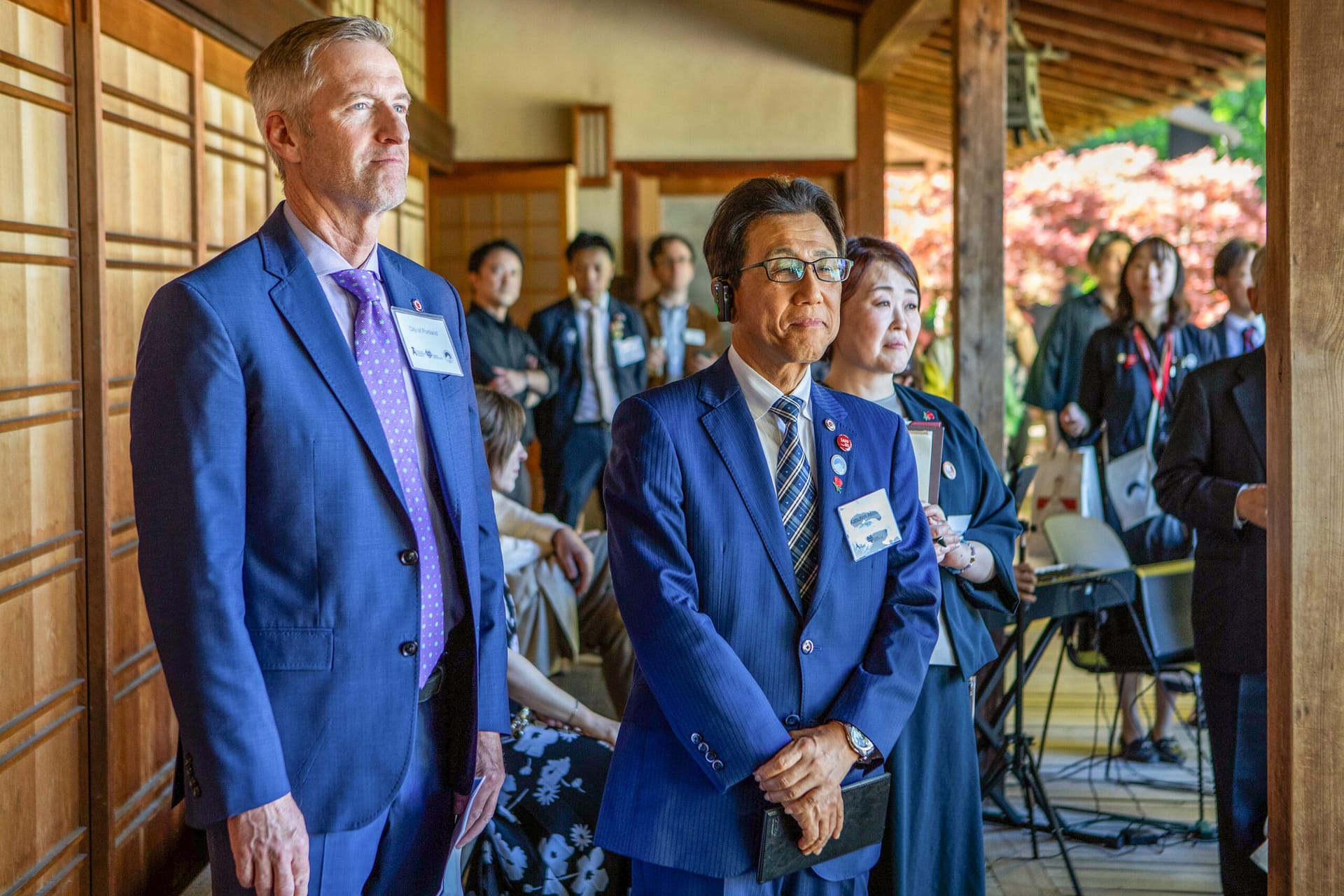
2024 marked the 65th anniversary of one of the United States’ oldest and strongest sister city relationships—Portland, Oregon in the U.S. and Sapporo, Hokkaido in Japan. This sister city relationship, which has fostered an everlasting friendship across the Pacific, has also come to be manifested in more tangible forms, including Portland Japanese Garden. The formal bond created with Sapporo was a catalyst for the development of Portland Japanese Garden and the Japanese city and its people have been instrumental in the organization’s continued success for more than 60 years. The Garden was honored to celebrate the milestone anniversary by holding a reception for Sapporo Mayor Katsuhiro Akimoto and Portland Mayor Ted Wheeler in June.
Tanabata, the Star Festival

Tanabata, the Star Festival, is one of five seasonal festivals that has been celebrated in Japan since the 8th century. Each summer in Japan, people prepare for the festival by writing their wishes on narrow strips of paper called tanzaku and hanging them with other origami paper ornaments on bamboo branches displayed at the entrance to their homes and public places. Guests attending Portland Japanese Garden’s Tanabata celebration wrote their own wishes on tanzaku and enjoyed music from Takohachi featuring storytelling of the Tanabata story.
Curator Emeritus Returns to Lead Maple Pruning Workshop

This year’s Maple Pruning Workshop was conducted by Sadafumi (Sada) Uchiyama, Curator Emeritus of Portland Japanese Garden, and Mark Bourne, a Japanese-trained master garden creator based in Seattle. With the Garden as the classroom, participants received a maple-focused tour, learned the fundamentals of maple pruning through a lecture, put their pruning methods and techniques to the test under the guidance of Sada, Mark and staff gardeners.
Gion Festival Lanterns Return to the Cultural Village

Guests arriving to Portland Japanese Garden this summer were able to enjoy a large lantern structure in the Atsuhiko and Ina Goodwin Tateuchi Foundation Courtyard of our Cultural Village. They are known as “Gion Festival Lanterns” and were first installed in this space back in 2018 when Portland Japanese Garden held an exhibition called Gion Matsuri: The World’s Oldest Urban Festival.
Tripadvisor gives Portland Japanese Garden a 2024 Travelers’ Choice Award

Tripadvisor, the world’s largest travel guidance platform, gave the Garden a 2024 Travelers’ Choice Award in July. The website noted, “the award honors businesses that consistently earn great reviews, placing them among the top 10% of listings around the world on Tripadvisor. …This award is based on genuine feedback from anyone in the community who has visited and left an authentic, first-hand review on Tripadvisor over a 12-month period, making it a valuable and trustworthy designation of great places to visit.”
August
Ambassador Shigeo Yamada and U.S. Securities Investor Protection Corporation Vice Chair Glen S. Fukushima Join International Advisory Board
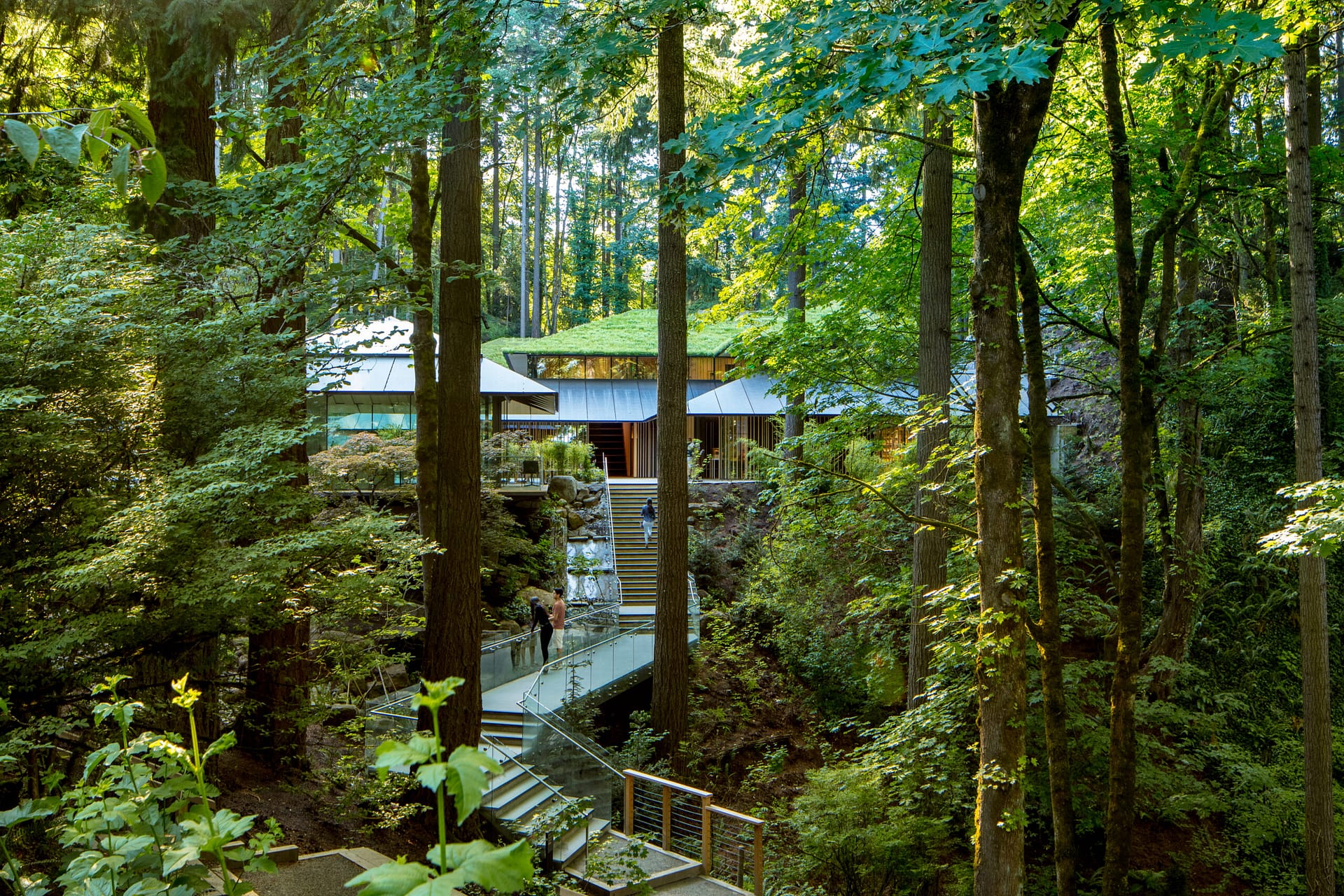
The International Advisory Board (IAB) supports Portland Japanese Garden and Japan Institute by sharing the organizations’ mission of Inspiring Harmony and Peace with a global audience and by making connections with leaders in Japan and around the world. This group of highly respected leaders, all from a diverse group of fields and industries, first collected under the IAB appellation in 2011. Portland Japanese Garden and Japan Institute were honored to announce the appointment of two more globally admired figures to the IAB, both of whom have spent decades in service to others: His Excellency, Ambassador Extraordinary and Plenipotentiary of Japan to the United States of America, Shigeo Yamada and Vice Chair of the U.S. Securities Investor Protection Corporation (SIPC), Glen S. Fukushima.
Ambassador Yamada Visits the Garden

In August, the Garden was honored to welcome Japan’s current Ambassador to the United States of America, Shigeo Yamada, in 2024. Ambassador Yamada was greeted by members of the organization’s leadership and given a tour of the grounds. Ambassador Yamada would share later, “Portland, Oregon has one of the most celebrated Japanese gardens outside of Japan. [Portland Japanese Garden] offers tranquility [and] a perfect setting to experience Japanese culture. I enjoyed being in the beautiful scenery [and] having Japanese tea at the Kashintei Tea House.”
O-Bon, the Spirit Festival

Portland Japanese Garden members were invited to take part in O-Bon, the Spirit Festival, an important Buddhist festival to honor ancestors and pray for the souls of the departed. They joined us during the magical hours of dusk in the Garden as we paid tribute to the memory of loved ones. O-Bon is both one of Portland Japanese Garden’s longest-held traditions and biggest events of the year. Reverend Zuigaku Kodachi, who proposed the idea of hosting the Spirit Festival to our organization in 1976, has introduced members of all religions and backgrounds to the Buddhist tradition of honoring the departed for close to half a century.
Bon-Odori, the Summer Festival

A highlight of summer festivals in Japan is the bon-odori (盆踊り/ Bon dance). Each region in Japan has their own version of the dance, as well as different music. In Japanese Buddhist tradition, bon-odori is a way to entertain and send off the spirits of our ancestors and celebrate life. Dancers circle the yagura, a high wooden bandstand for the musicians and singers. At the Garden, dances were taught by Chris Dart and demonstrated by dancers from Oregon Buddhist Temple.
September
Ikebana International Celebrates the Chrysanthemum

Ikebana International (Portland Chapter #47) celebrated the chrysanthemum in a special, two-day only exhibition in the Pavilion. Ikebana International first celebrated Kiku Matsuri, the Chrysanthemum Festival, at Portland Japanese Garden in 1983. Local ikebana artists from various schools, or styles, created arrangements featuring chrysanthemums, known as kiku in Japanese. Kiku Matsuri, or Choyo no Sekku, observed in Japan in September, is the final of the five seasonal Go-Sekku festivals in Japan’s traditional lunar calendar. Chrysanthemums symbolize longevity, dignity, and nobility.
O-Tsukimi, the Moonviewing Festival

Moonviewing, or O-Tsukimi in Japanese, is the practice of gazing at the full moon and enjoying its sacred beauty. Since 1990, Portland Japanese Garden has scheduled this beloved annual event to coincide with the harvest moon, which occurs anytime from September to early October. Guests enjoyed meals by by Obon Shokudo and beverages from Joto Sake and Pfriem Family Brewers, enjoyed music played shamisen (three-stringed instrument) and shakuhachi (bamboo flute), a candle-lit Tea Ceremony, and a special display of ikebana accompanied by tsukimi dango.
Kintsugi: The Restorative Art of Naoko Fukumaru Opens
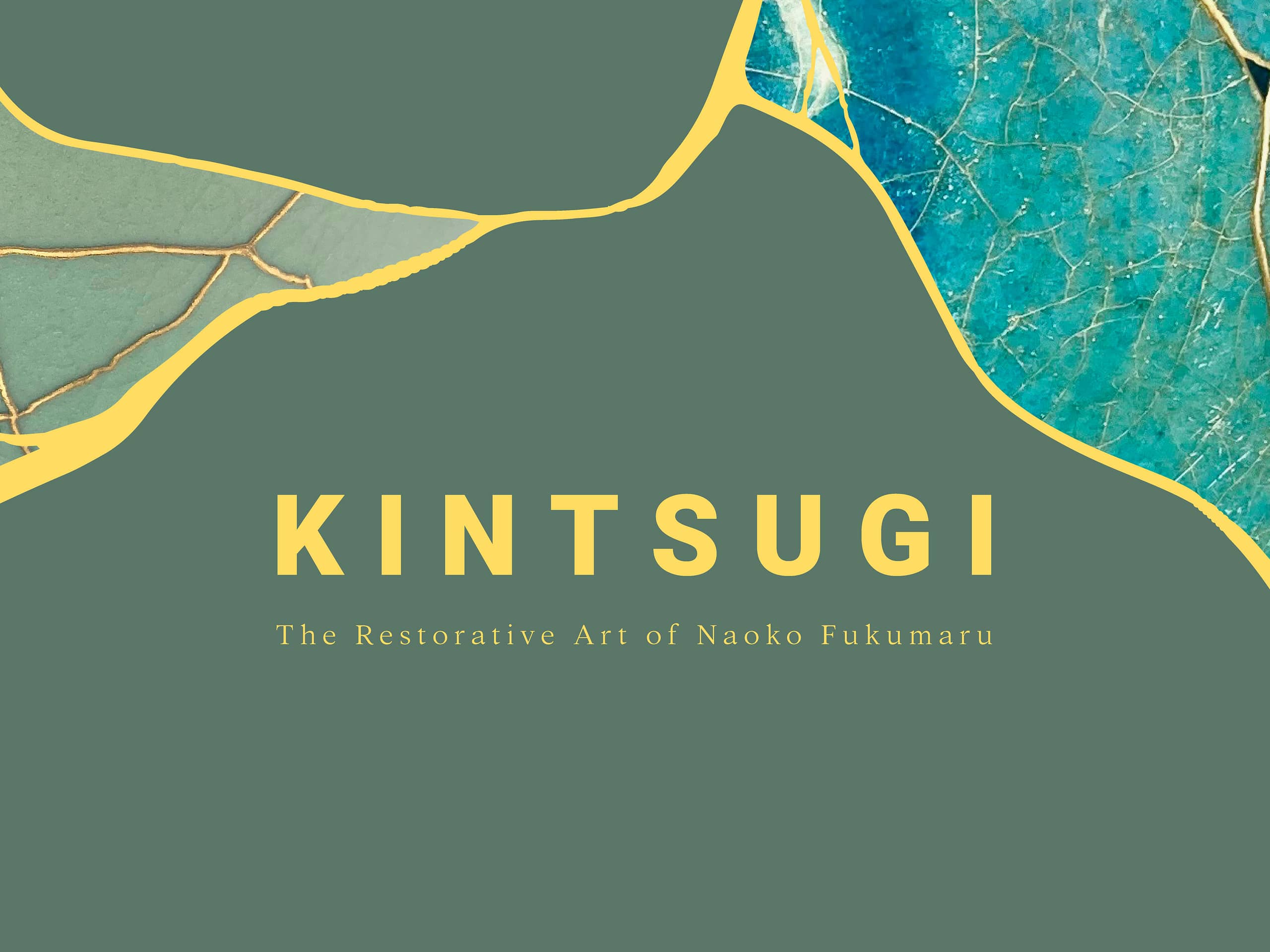
Portland Japanese Garden was thrilled to debut Kintsugi: The Restorative Art of Naoko Fukumaru in its Pavilion and Calvin and Mayho Tanabe Galleries this fall. Kintsugi is an ancient method of mending damaged ceramics using urushi (natural lacquer) dusted with powdered gold. This type of mending highlights the beauty of imperfections, rather than trying to hide them. This timely exhibition (running into 2025) explores universally resonant themes of healing through the artwork of kintsugi artist and master conservator Naoko Fukumaru.
Joto Sake Presents Tasting to Celebrate World Sake Day
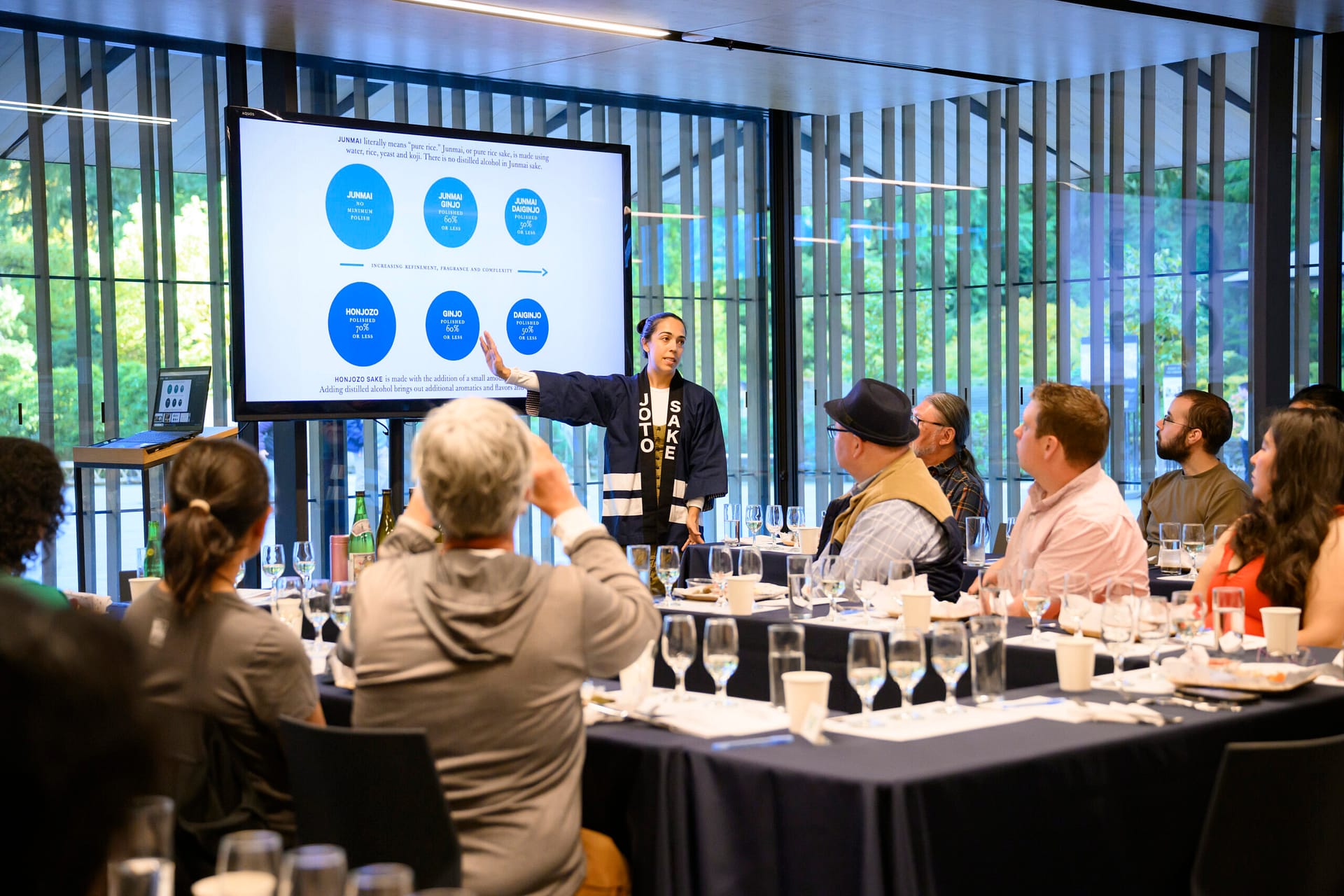
This exciting and exclusive afternoon tasting featured products from Joto Sake, the Garden’s official sake partner. Founded in 2005, Joto is one of the leading artisanal portfolios of its kind in the U.S. They represent ten multi-generational, family-owned jizake (local) breweries located throughout Japan. Held in part to celebrate World Sake Day (October 1), Joto presented six special sake offerings. Ryan Mellinger, General Manager for Joto Sake at Kobrand Corporation, walked guests through the structure, history, and brewing process of a variety of sakes that are deeply connected to Japanese culture.
October
Acclaimed Musicians Andy Akiho and Jeffrey Zeigler Perform Special Recital
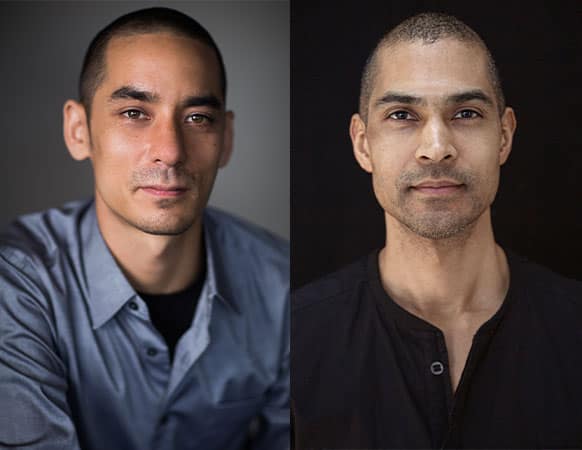
Jeffrey Zeigler (Cello) and Andy Akiho (Steel Pan; Composer) explored the musical and philosophical themes of Nisei – Akiho’s first cello concerto, which was then premiered by the Oregon Symphony and Jeffrey Zeigler at the Arlene Schnitzer Concert Hall. The title Nisei takes its name from the first generation of Japanese American children born in the United States. The piece was written by Akiho for Zeigler, who are both half-Japanese and drew upon the two men’s diverse musical roots and shared cultural lineage.
Lecture Presented on Katazome, Japanese Technique of Dying
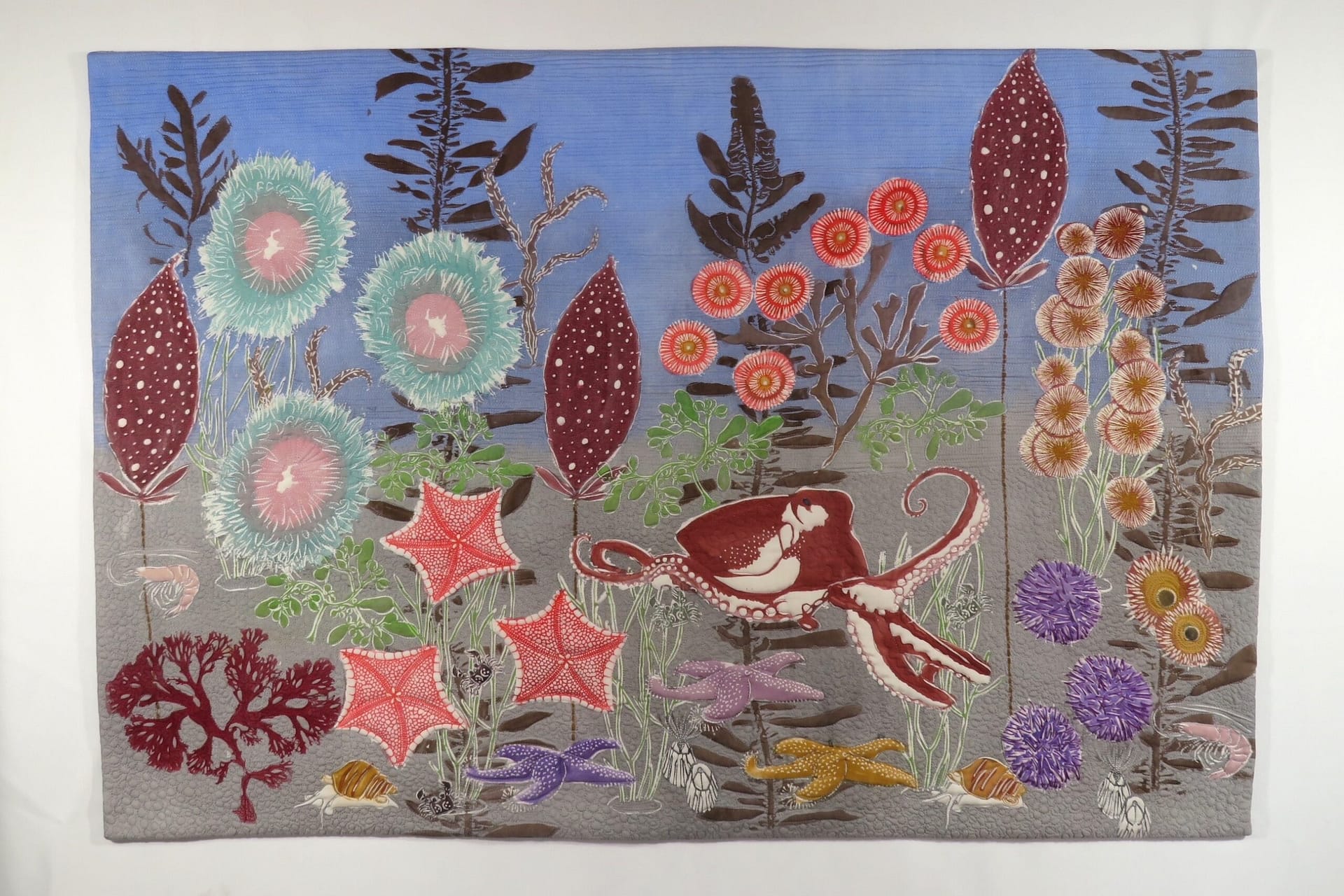
Katazome is a Japanese technique of dying fabrics or paper using a resist paste made of rice flour applied to fabric through a stencil. For 500 years, Japanese kimono and textiles have been produced with paper stencils. Karen Illman Miller, who has worked in the artform since 1994, presented an introduction on it in the Jordan Schnitzer Japanese Arts Learning Center.
Webinar Series Explores the Best Kept Secrets of Japan

Japan Institute of Portland Japanese Garden invited folks to deepen their knowledge of the aesthetic essence underlying Japanese art and craft with a three-part webinar series beginning in October. Steve Beimel from JapanCraft21 spoke on the craftsmanship invested into Kyoto’s Japanese gardens. Continuing in November, the webinar dived deeper into Japanese aesthetics with a look at the nation’s remarkable crafts, a rich and diverse output that has influenced several Japanese cultural pursuits, including gardening. In December, the series wrapped up by focusing on the artistry of everyday ceramic vessels that Japanese craftspeople make extraordinary.
Ohara School of Ikebana Show Impressions of Autumn

The stunning displays of brilliant reds and golds in autumn and ikebana arrangements have something in common, they are both fleeting. Those who visited Portland Japanese Garden during its special two-day exhibition, Impressions of Autumn: The Colors of Autumn were be able to appreciate the beauty of both fall in the Garden and ikebana arrangements as prepared by the Ohara School of Ikebana Oregon Chapter.
Granddaughter of Archbishop Desmond Tutu Presents Lecture on Indigenous Knowledge
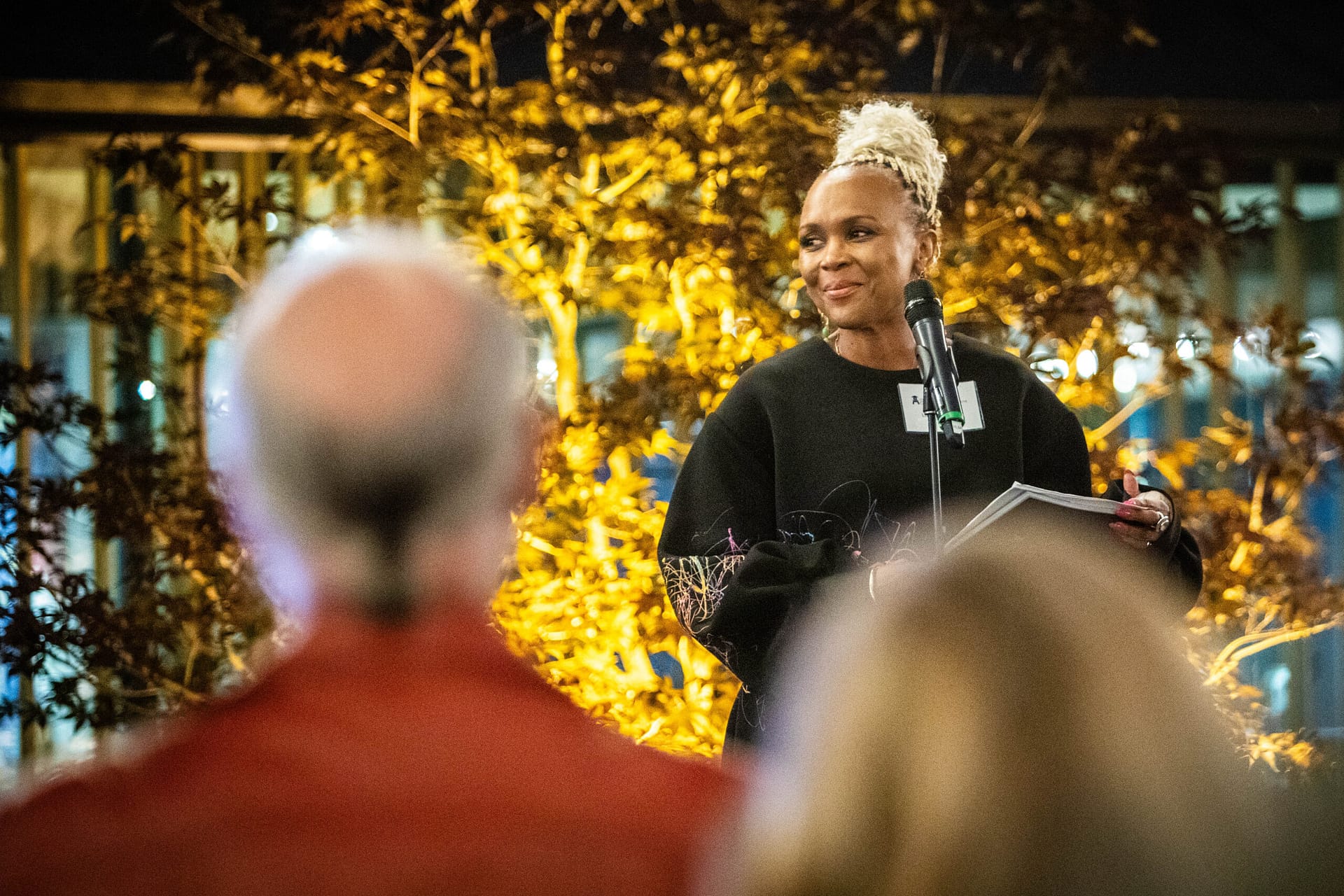
In this thought-provoking lecture hosted at Portland Japanese Garden, global thought leader Lungi Morrison explored the powerful role of Indigenous knowledge in driving social impact. Drawing on examples from the history of her native country, South Africa, contemporary Indigenous expressions, and insights from the Japan Institute’s South Africa Peace Programming, she illuminated how culture, art, and nature can be harnessed to foster peace-making, community-building, and active citizenship. This lecture from the granddaughter of the Nobel Peace Prize Laureate, Archbishop Desmond Tutu, offered a compelling vision of how inclusive dialogue and cultural exchange can contribute to creatively addressing contemporary social challenges.
November
Panel Discussion Explores Reconciliation and Integration Through the Art of Kintsugi
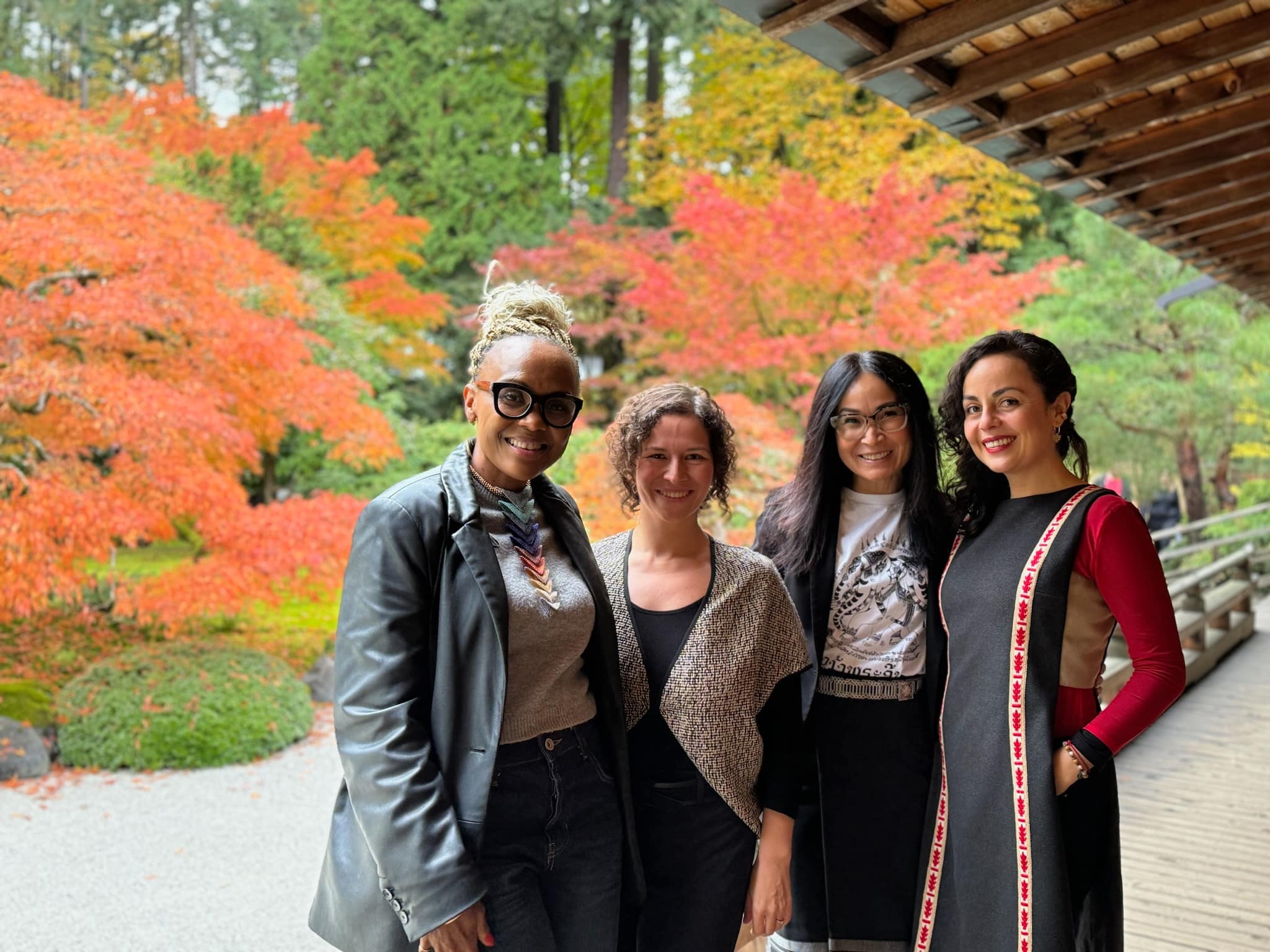
Exploring how art fosters reconciliation and social integration, in November the Garden hosted a panel discussion featuring insights from three global visionary leaders—Maria Elisa Pinto-Garcia (Colombia), Lungi Morrison (South Africa), and Toc Soneoulay-Gillespie (Laos and Oregon) with Paula Esguerra, Director of Japan Institute’s International Exchange Forum (2022-24) moderating. Through a close look at practical applications of the Japanese craft of repairing ceramics with gold, kintsugi (金継ぎ), and the Heart Maps methodology of using dialogue and drawings to positively shift perspectives and stereotypes, the conversation highlighted the transformative power of art and creativity to heal, repair and reimagine aspects of our humanity that may otherwise be labeled as “broken”.
Sogetsu School of Ikebana Presents Fall Show

The Sogetsu School of Ikebana believes ikebana can be practiced anytime, anywhere, by anyone. Local artists from the Sogetsu Portland Branch created a wide range of styles from basic to abstract which use objects of sculptural intent and character. The three main elements designers used were line, mass, and color, with an emphasis on the designer’s individual artistic expression and creativity.
Kintsugi Workshop Transforms Hidden Weak Points into Beautiful Gold Elements

Portland Japanese Garden partnered with Emi Joyce, a Portland-based kintsugi restorer and instructor, to provide two modern kintsugi workshops in November. While the traditional method used by experts is challenging and requires cautious handling of materials like urushi lacquer, the “modern” kintsugi method uses accessible materials and is ideal for beginners. The Garden was thrilled to offer this opportunity for its guests to get hands-on experience with this beloved artform.
Peter Freedman Memorial Oregon State Go Tournament Returns

In November, players competeed in the Peter Freedman Memorial Oregon State Go Tournament. Go is a game that is believed to have been played in Japan since the Nara Period (710-794). Visitors to the Garden were able to observe the tournament games in progress in the Yanai Classroom and attend a public presentations by Stewart Towle of Portland Go Club to learn about the origins and cultural history of Go and learn to play this 5000-year-old game of skill.
Workshop Teaches the Role of the Guest in Tea Ceremony

Guided by skilled instructor Jan Waldmann, Sosui, the focus of this workshop was to learn to be a guest in the Tea Ceremony, an important aspect to this historic tradition. Participants learned the proper etiquette for attending, including how to receive and take sweets and matcha, and most importantly, the reasons behind each of the steps. Additionally, they gained insight into what it entails to be a host— understanding the occasion and seasonality, attention to aesthetics, careful preparation, and the thoughtful gestures made toward the guests.
December
Yukizuri Return to the Garden

Visitors to Portland Japanese Garden this winter will see additions to its grounds that haven’t been present since the 1980s: yukizuri (sometimes transliterated as “yukitsuri”). Yukizuri (雪吊り) are aesthetically pleasing support systems that protect and prepare trees for winter—yuki means “snow” and zuri or tsuri means “lifting.” In this we understand precisely how they help protect trees: Straw ropes are cast down from a central pole, almost like the frame of an umbrella. The ropes are then tied to branches to help lift them up with the thought being they’ll better withstand the weight of heavy snowfall or frost.
Steve Bloom Participates in Final Public Event as CEO

Members and those in the Golden Crane Recognition Society visited the Garden for a fireside chat with Steve Bloom in his final public event as CEO. Bloom reflected on more than 30 years of service to his community. He was joined by Dorie Vollum, a member of the Garden’s Board of Trustees and Board President from 2017 to 2018.
Taiyo Onoda, Member of Kodo, Performs Taiko Drum

Taiyo Onoda, a member of the famed taiko group, Kodō, based in Sado Island, Japan, performed for guests in a special appearance in the Cathy Rudd Cultural Corner in the Jordan Schnitzer Japanese Arts Learning Center. Onoda, who was born in San Francisco, started playing taiko in the U.S. when he was eight years old. He entered the Kodō Apprentice Centre in 2016 and became a Kodō Member in 2019.